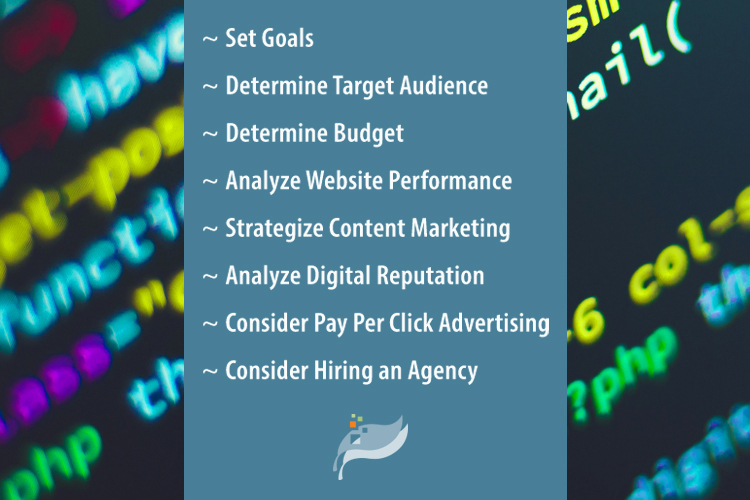In today's digital age, establishing a robust online presence is imperative for businesses of all sizes. Digital marketing plays a pivotal role in achieving this, but it's crucial to set clear goals, define your target audience, and allocate an appropriate budget to ensure success. In this blog post, we'll delve into the essential steps to create a digital marketing strategy that drives results for your company.
Setting Digital Marketing Goals
How do we set our digital marketing goals as a company? Your goals should begin with your greatest need. Are you below budgeted occupancy? Do we have an issue with our online reputation? Is recruitment a problem? Maybe it is simply that your audience isn’t aware of your brand.
In the News
Senior Housing News featured Cappella Digital Marketing Solutions in a recent article and interview with CLC President and CEO Jill Vitale-Aussem.
Setting clear and achievable digital marketing goals is the foundation of any successful campaign. To begin, identify your company's most pressing needs and challenges. Are you struggling with occupancy rates, online reputation, recruitment, or brand awareness? Your goals should directly address these areas.

Determining Your Target Audience
How do we determine our target audience? Start by looking at your current residents. What commonalities do they share? Who are the decision-makers, the resident or a loved one? Talk to residents and find out what are the key deciding factors that made them choose your community. Are those factors still important to them? The answers to these questions can help you determine your target audience. Additional information can be gleaned from CRM or other databases. What geographical information can you find about prospects? What behaviors do your best prospects have in common? Once you have this information, you can build out a persona on what your target audience might look like.

Understanding your target audience is paramount in crafting an effective digital marketing strategy. Start by analyzing your current residents and identifying common characteristics and preferences among them. Determine who the decision-makers are – is it the resident themselves or their loved ones? Conduct surveys or interviews with residents to discover the key factors that influenced their choice of your community and whether these factors remain significant to them.
To further refine your target audience, leverage data from Customer Relationship Management (CRM) systems and other databases. Explore geographical information about prospects and identify common behaviors among your most promising leads. With this information in hand, you can create detailed buyer personas that represent your ideal target audience.
Setting Your Digital Marketing Budget
How do I know how much to spend on digital marketing? Determining how much to allocate to your digital marketing efforts involves several considerations. According to the Small Business Administration, a general rule of thumb is to allocate between 7% and 8% of your total revenue to marketing. However, most of this budget should be dedicated to digital channels, with some reserved for traditional marketing materials like brochures and flyers.
Consider the cost of advertising, your revenue per customer, and the percentage of your total revenue. A crucial metric to track is the Cost per Lead (CPL), calculated by dividing your total marketing expenditure by the number of leads generated. At Cappella Digital Marketing Solutions, we base our budget decisions on the value of each lead. For instance, if you sell running shoes with a $50 profit per pair, you wouldn't want to spend $55 on acquiring a single lead. However, if your products offer a higher profit margin, such as $1500 per sale, a $50 Cost per Acquisition (CPA) becomes entirely reasonable.
It's essential to keep in mind that marketing budgets are evolving toward digital efforts. In 2022, organizations allocated an average of 13.8% of their total budget to marketing, with an expected increase of 16.2% in 2023. Ultimately, your budget should be data-driven and aligned with your business goals, profitability, and expected return on investment.
Website Performance
Is my website performing as it should? There are several factors to consider when assessing your website's performance. These factors include website speed, user experience, SEO optimization, mobile optimization, and conversion rate. You can use tools like Google Analytics, Google Search Console, and website speed test tools to get quantitative data on these aspects. For qualitative data, you could conduct user surveys or user testing to understand their experience.

Is my website secure? Am I compliant with privacy regulations? To ensure your website is secure, you can use various online tools that scan for vulnerabilities. Some of these tools include website security checkers that identify security gaps and provide recommendations for improvements.
Moreover, a data privacy audit can also be conducted to determine your current data privacy compliance risk level. This audit is based on the requirements of various privacy laws. It's important to note that while these tools can provide a snapshot of your compliance, they may not cover every aspect of privacy laws. For a comprehensive review, consider consulting with a legal expert in data privacy. Compliance regulations can vary from state to state.
Content Marketing
What is a content marketing strategy? A content marketing strategy is a high-level plan that focuses on creating and distributing valuable, relevant, and consistent content to grow an audience and reach various business goals. This strategy includes various types of content such as blog posts, emails, social media posts, and videos. It plays a critical role in achieving specific goals, increasing online visibility, generating more leads, establishing authority, and engaging customers. The key elements of a successful content marketing strategy are producing content that is a resource to your audience, is not “salesy” and aligns with your digital marketing goals. A solid content strategy will set your business as a trusted advisor, and that is a good experience for your website visitors as well as search engines.
Digital Reputation
How important are online reviews? Online reviews are highly valuable to both businesses and customers. For consumers, they serve as a digital form of word-of-mouth marketing, influencing purchasing decisions with 93% of consumers acknowledging their impact. They provide social proof, building trust and validating the expertise and credibility of a brand.

From a business perspective, online reviews are critical for establishing brand trust and increasing the likelihood of customer purchases. In fact, brands with online reviews are trusted 63% more than those without. A lack of reviews can increase perceived risk and deter potential customers. Therefore, as part of a comprehensive digital marketing strategy, businesses should actively collect, manage, and utilize customer feedback.
Pay Per Click Advertising
Where do I start with Pay-per-click advertising? Pay-per-click (PPC) advertising is a digital marketing strategy that can significantly boost your online visibility and lead generation. Here's a step-by-step process to get started:
- Set Clear Objectives: Determine what you want to achieve with your PPC campaign. This could be increased website traffic, lead generation, product sales, or brand awareness.
- Identify Your Target Audience: Understand the demographics, preferences, and online behavior of your potential customers. This will help you create more targeted and effective advertisements.
- Choose the Right Platform: Google AdWords is the most popular PPC advertising platform, but you can also consider Bing Ads, Facebook Ads, or LinkedIn Ads, depending on where your target audience is most active.
- Keyword Research: PPC campaigns are keyword-driven. Use tools like Google Keyword Planner to find relevant and high-performing keywords in your industry.
- Create Compelling Ads: Your ad copy should be engaging and persuasive. It should clearly communicate your value proposition and include a strong call-to-action.
- Set Up Landing Pages: When a user clicks on your ad, they should be directed to a landing page that matches the promise of the ad and allows the user to complete a specific action (like making a purchase or signing up for a newsletter).
- Set Your Budget and Bids: Decide how much you're willing to spend on your PPC campaign, and how much you're willing to pay per click. This will be influenced by the competitiveness of your keywords and the average cost-per-click in your industry.
- Measure and Optimize: Regularly review the performance of your PPC campaign using platform-specific analytics. This will allow you to tweak your campaign for better results over time.
Remember, PPC advertising is not a set-it-and-forget-it strategy. It requires ongoing monitoring and optimization to ensure it's delivering the desired results.
How do I know if my digital ad campaigns are working? To know if your digital ad campaigns are working, you need to set specific goals and key performance indicators (KPIs) for the campaign. These could include metrics like click-through rates, conversion rates, and customer acquisition costs. It is also important to define the difference between a lead and an inquiry. It is far easier to drive inquiries that may not be sales-qualified. Those numbers can look impressive, but campaigns that produce actual qualified leads are much more valuable. This is a case of quality over quantity.
Next, use analytics tools such as Google Analytics to track and measure campaign performance. This will give you a clear picture of how users are interacting with your ads and whether they're leading to desired actions, like purchases or sign-ups.
You can also monitor social media metrics to understand the reach and engagement of your campaign.
Implementing A/B testing can help you determine the most effective version of a campaign. By comparing different versions of an ad or landing page, you can identify which elements are driving the best results.
Remember, consistent monitoring and analysis are key to understanding the effectiveness of your digital ad campaigns.
Is an Agency the Right Choice?
 Why should I hire a Digital Marketing Agency? Hiring a Digital Marketing Agency provides several advantages. For one, they offer expert guidance drawn from a wealth of experience, which can be invaluable in navigating the ever-evolving digital marketing landscape. By outsourcing your marketing needs to a professional agency, you can better focus on your core business operations.
Why should I hire a Digital Marketing Agency? Hiring a Digital Marketing Agency provides several advantages. For one, they offer expert guidance drawn from a wealth of experience, which can be invaluable in navigating the ever-evolving digital marketing landscape. By outsourcing your marketing needs to a professional agency, you can better focus on your core business operations.
Moreover, they come equipped with the latest technologies and tools to optimize your campaigns, ensuring that you stay competitive in your industry. Their services are scalable, allowing for flexible and cost-effective solutions.
Another significant advantage is the ability to see measurable results. These agencies use tracking, analytics, and reporting to provide a clear insight into your campaign's performance. This data-driven approach allows for more targeted and effective campaign adjustments.
Lastly, they offer a fresh perspective and accountability, while their wide reach allows for both local and global marketing strategies. With their industry experience, they can manage resources efficiently and deliver results.
However, not all agencies are the same. Be sure you hire someone who understands your field, your goals and mission and is going to see you as a unique client. Never allow an agency to work unchecked. Ask for Quarterly Business Reviews and always own your website and other collateral.
At Cappella Digital Marketing Solutions we are committed to supporting non-profit senior living communities through innovative digital marketing principles. Our mission is to apply the disciplines that have been successful in our own communities to strengthen the client’s online presence, elevate brand awareness and drive meaningful lead generation.
Want to chat? Contact us at CDMS@CLCLiving.org
About the Author
Robin Visser serves as Director of Marketing and Digital Strategies at Christian Living Communities. Robin has a wealth of digital marketing experience both in senior living and global industries, along with a background in broadcast and video production. Her strengths are in digital strategies and innovative ideas.


